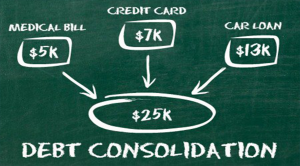Mastering Debt Elimination: Strategies to Reclaim Your Financial Freedom
Debt is a challenge faced by many, and it’s easy to feel overwhelmed by the…
Debt is a challenge faced by many, and it’s easy to feel overwhelmed by the weight of bills and calls from relentless collection agents. However, overcoming debt begins with a shift in perspective—understanding that getting out of debt is a process, not a quick fix. Many people rush to solutions like bankruptcy, only to discover its long-lasting effects. Instead, it’s crucial to explore alternatives like debt consolidation or settlement, both of which can help improve your credit score over time.
In this article, we’ll explore practical debt elimination methods that empower you to regain control of your finances and move toward a debt-free life.
Debt Elimination Takes Time, But It’s Worth It
There’s no “magic wand” to instantly fix your credit score or wipe away debt, despite what some online ads may promise. Real financial recovery requires time and patience, but the good news is that it’s entirely possible. Debt consolidation and settlement are two strategies that offer structured, gradual improvements in your financial health.
Debt consolidation involves combining multiple debts into one single payment, often at a lower interest rate, making it easier to manage. Debt settlement, on the other hand, means negotiating with creditors to pay off debts for less than what you owe. This can be a daunting task, but today, credit advocates can assist you with negotiations, ensuring that your rights are respected and helping you reach favorable agreements.
The Role of Credit Advocates
Credit advocates have expertise in dealing with creditors and collection agencies. They work on your behalf to negotiate fair settlements, ensuring that creditors stick to ethical practices. With their help, you can avoid the anxiety of facing creditors alone and receive guidance tailored to your situation. Their experience can put you on a faster track to financial recovery.
Why Credit Monitoring is Essential
Even if you successfully settle or consolidate your debts, it’s vital to remain vigilant about your credit. Many people are surprised to find settled debts reappearing on their credit reports due to errors or shady practices. That’s why investing in a credit monitoring service is a smart move. Credit monitoring keeps you informed of any changes to your report, allowing you to address issues as soon as they arise.
When choosing a credit monitoring service, ensure it offers:
- Access to all three credit scores (from the major credit bureaus).
- Alerts for suspicious activity, such as unauthorized hard inquiries or identity theft attempts.
- Easy access to your credit report, without affecting your credit score (these are called soft inquiries, which do not harm your credit).
Choosing the Right Debt Elimination Strategy
Before deciding on a debt elimination method, it’s important to explore your options. Bankruptcy is a last resort, but many alternatives exist that can help you tackle debt without damaging your financial future. Non-profit organizations offer counseling and support, helping you navigate debt repayment plans, budgeting, and more. They also provide emotional support, reminding you that you’re not alone in this journey.
Being in debt can take a heavy toll emotionally, which is why support groups and forums are valuable. They connect you with others who’ve faced similar struggles and succeeded in overcoming them. The internet has made it easier than ever to access this kind of peer support, allowing you to learn from firsthand experiences shared by others.
You’re Not Alone: The Power of Community
One of the greatest misconceptions about debt is that it must be faced alone. In reality, countless others have been in your shoes and emerged victorious. Online communities, forums, and support groups offer invaluable resources, practical advice, and emotional encouragement. By connecting with others, you can gain new insights and feel empowered to take control of your financial situation.
A Final Thought: Taking Charge of Your Financial Future
Ultimately, reclaiming your financial freedom starts with a decision—one only you can make. Clearing your debt and improving your credit will require time, effort, and discipline. However, once you make the commitment, you’ll find that the process becomes clearer and more achievable.
Debt is costing you more than just money—it’s preventing you from achieving your goals and living the life you want. The sooner you take action, the sooner you can start creating the financial future you deserve.







